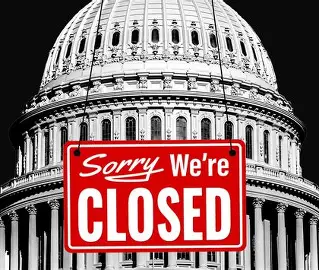
|
|||||||
|
 Brinks Concerned About Shutdown; Hall Reiterates House Gop Taking Their Time on Budget Brinks Concerned About Shutdown; Hall Reiterates House Gop Taking Their Time on BudgetSenate Democrats on Wednesday asserted again that House Speaker Matt Hall and his Republican caucus are delaying action on negotiating a budget, saying their actions are hurting the state's schools and creating uncertainty ahead of the upcoming new school year. Hall, in a competing press conference, sought to refute Democratic claims, accusing the Senate of having a faulty budget that needs to be reworked before serious negotiations can begin. He defended his accusation by saying the Senate Democrats based their budget on January revenue estimates, though that is a common practice. Senate Majority Leader Winnie Brinks, D-Grand Rapids, also told reporters she and Hall, R-Richland Township, had not spoken one-on-one in a month. Hall, however, doubled down on claims that there have been more regular conversations between leadership than is publicly known. The ongoing blame game between the divided Legislature continued Wednesday with only 48 days remaining before the September 30 budget deadline. "Given the track record that we've seen from House Republicans, I am concerned," Brinks said when asked if she has concerns over a potential state government shutdown. "We should have been doing all of this together as a Legislature months ago. It's not that it's impossible to get it done, but the clock is ticking, and there is a sense of urgency around it, and it's simply not responsible to delay any longer." Separately, Senate Appropriations Committee Chair Sen. Sarah Anthony, D-Lansing, told reporters both sides to get to the table and begin serious negotiations given the fallout of federal funding changes expected to reduce revenue. "I don't want to say we're gearing up for a shutdown, because that has real impacts on state employees and on the individuals and organizations that rely on the state's budget," Anthony said. "I'm still here, ready to work and motivated, but we always have to look at contingency plans if that happens." She added that there have been conversations over the summer recess between herself and her staff and House Appropriations Committee Chair Rep. Ann Bollin, R-Brighton, and Bollin's staff on general issues. The senator referred to when she was a legislative staffer for a previous Appropriations chair during government shutdowns in the 2000s. She said it was a rough time for state employees, who were unsure if they would be receiving their paychecks. "Whether we're talking about a shutdown for a number of days or weeks or even a few hours, the anxiety is real," Anthony said. Anthony spoke to reporters after her committee heard testimony from Department of Health and Human Services officials and several health care, business and policy organizations on the effects of the federal budget bill signed into law on July 4. The federal law changes are estimated to lead to significant revenue shortages for the fiscal year 2025-26 budget, which the House Fiscal Agency put at $677 million and the Citizens Research Council of Michigan put at more than $1 billion (See Gongwer Michigan Report, July 30, 2025). Senate Democrats who joined Brinks on Wednesday described the budget impasse as embarrassing, laying the blame at the feet of Hall and his caucus. They said they stand ready to negotiate and that the lack of movement by Republicans is causing uncertainty for schools and prompting cuts to programs including the free school meals programs over funding concerns. Hall continued to blame the Democrats. "The one thing that would break the logjam is a Senate Democrats roads plan," Hall said. "Governor Whitmer wants to do it. I want to do it. Senate Democrats will put a plan on the table soon. … We want a roads deal. We want to set priorities on the budget." Sen. Darrin Camilleri, D-Trenton, chair of the Senate Appropriations PreK-12 Subcommittee , said the Senate education budget proposal as passed is balanced and could quickly be passed if House Republicans were to come to the table and hammer out a compromise on differences. "The sad reality is, however, is that Speaker Matt Hall has no interest in doing what's right for the residents of our state," Camilleri said. Camilleri took further aim at Hall, saying he "is losing respect daily in Lansing and across Michigan." "It's pretty embarrassing that we're in this situation," Camilleri said. "If you acted like this at any other job, your boss would put you on a performance improvement plan. But because he's in a position of power and we are in politics, he thinks his obstruction and arrogance will be rewarded. We cannot let that happen." Sen. Dayna Polehanki, D-Livonia, said school districts are already discontinuing free school meals programs and other programs due to budget uncertainty. "Matt Hall's inaction and the complacency of his caucus are impacting more than just the school meals program," Polehanki said. "Funding for critical student services like mental health supports, school safety, career and tech education and so much more is stuck in limbo, leaving our schools and students in a lurch." Sen. Jeff Irwin, D-Ann Arbor, pointed out that the House has not yet passed its budget proposal. "He's been unwilling to show us the math of how this budget actually looks," Irwin said. "How can we move forward on getting a final budget when they won't even take the first step?" Brinks also disputed an oft-used claim by Hall that the governor and Brinks are at serious odds over the budget and a road funding plan. "He is eager to try to give the impression that there's a wedge between the Democrats in the Legislature and the governor. This is simply not the case," Brinks said. "We have far more in common than and small differences of opinion that might come up, and we have proven that we can work through that in a very productive way over the last two budget cycles, and we'll continue to do that as the need arises." The Senate moved a handful of House bills on Wednesday, which Hall said was a good sign. "They're moving our bills, which is what they should have done all along," Hall said. Despite action from the Senate on House bills, Hall said he did not intend to move Senate bills. "We're moving the bills that are ready to go, and their bills are not ready to go," he said. Hall said House Republicans continued to take their time on the budget. "It's like the Democrats' heads are exploding when you try to explain to them we're not going to do the same thing that you guys have always done up here, and just tack on 4%," Hall said "We're going to look at these budgets, we're going to eliminate waste, fraud and abuse, and we're going to get value for your tax dollars." When asked whether the Legislature can fund its top priorities in an upcoming budget deal, Anthony said Republicans need to come to the table so that the give-and-take of negotiations can occur to best meet the state's needs. "We can find a way to address some of these drastic cuts," she said. "But the first step is to actually start negotiating."  Senate Education Dems Seek Path Forward for Class Size Grants with Pilot Program Bills Senate Education Dems Seek Path Forward for Class Size Grants with Pilot Program BillsA Senate panel heard testimony Wednesday on bills to establish a $65 million grant program to incentivize smaller class sizes in public schools, a policy also housed within the chamber's budget that's currently stalled in a bicameral logjam. Sen. Darrin Camilleri, D-Trenton, and Sen. Dayna Polehanki, D-Livonia, put forth SB 493 and SB 494 to specifically address large class sizes in select kindergarten through third grade programs, with hopes of a larger state solution to oversized classes in other ages. The Senate Education Committee discussed the bills Wednesday. Starting with K-3 classrooms, Camilleri said, was deliberate, since research shows large class sizes during those formative years of education and child development can lead to problems down the road. "I taught primarily 11th and 12th graders, and you can see the ramifications of not having those interventions early on in that student's academic career by the time they reached me," Camilleri said of his own teaching experience. "We did everything we could at my stage with our social studies classroom, but often it is not enough. You have to reach these kids when they're younger in order to make those literacy gains that we all want. Having these lower class sizes would do that." The bills would allow districts to apply to receive grants from an initial $65 million fund, provided they fall within certain parameters of the Opportunity Index and other demographic and size requirements. Four high-need districts identified by the Department of Education – Muskegon Heights, Benton Harbor, Flint and Wayne-Westland – would be guaranteed to receive grants . Camilleri said even though the grant program is provided for in Senate Democrats' budget, he and Polehanki wanted to approach it within policy bills as well. With a canyon's worth of distance between the House and Senate versions of the School Aid Fund budget for the upcoming fiscal year and seemingly stalled negotiations, Camilleri said they feel it's important to address class sizes regardless of the budget. "This is a reflection of some of the language that we implemented in our Senate version of the School Aid budget, which is sitting in the House chamber, awaiting action as schools are going to be opening up their classrooms shortly. Many schools are starting as soon as next week," he said. "We're hoping to continue the conversation, obviously, on getting a budget done, but this is one component that we know is critical, investing in smaller class sizes. We're hopeful to push this through on the policy side of the Legislature as well." The bills received supportive testimony from MDE officials, who cited studies done in other states like Wisconsin and Tennessee which showed a link between smaller class sizes and better academic outcomes for students. Many states have already implemented some sort of regulation for class sizes to limit student-to-teacher ratios, MDE Deputy Superintendent Delsa Chapman told the committee. Michigan is one of the few with no policy in place for kindergarten through third grade. "According to the 2020 Education Commission of the States' 50-state comparison of K-3 class size policies, at least 28 states have statutes or regulations outlining teacher to student ratios, ranging from one to 15 ratio to a one to 25 ratio, with some states providing districts with oversight," Chapman said. "Several states combine these in statute or regulation. Five states include laws that dictate funding must be used to lower teacher-to-student ratios when funds are available. Fourteen states and Washington, D.C. have no statutes or regulations regarding this issue. Michigan is one of these 15 with no K-3-related class size laws or policies." Researchers said not only would decreasing class sizes help students, but it would also have a positive impact on the teacher workforce. Rightsizing teacher-to-student ratios statewide would be a massive financial undertaking, Michigan State University education policy professor Josh Cowen said, but one that would have a significant return on investment. "Teachers consistently rank class size ahead of many other factors when deciding whether to serve or leave a particular school – class sizes rank just below teacher pay," Cowen said. "Parents consistently rank smaller class sizes as one of the most important determinants of school quality that they make. Another recent survey suggested that parents view low class sizes well above the average standardized tests of the schools when they're selecting schools for their child." The committee did not vote on the bills. DCD OUT & ABOUT 
Senator Mat Dunaskiss was happy to join his fellow DMAN Board Members and founder Ziad Kassab this year at the Woodward Dream Cruise! Each year the DMAN foundation makes dreams come true for individuals with disabilities by giving them the unforgettable experience of cruising Woodward in classic cars. It's not just about the ride — it's about empowerment, inclusion, and pure joy and Senator Mat was happy to be a part of it once again! DCD IS A FULL-SERVICE, BI-PARTISAN, MULTI-CLIENT LOBBYING FIRM REMEMBER ALL OF DCD'S SERVICES: ARTICLES OF POLITICAL INTEREST:
Michigan Schools Returning Without State Budget, Warning Free Meals May Not Last Marijuana News, Updates, & Articles of Interest
We are here to help you with: municipal lobbying, license application writing and assistance, business plans, state required operations manuals and compliance, facility design, corporate structure, and design and branding. We are experts in both medical and recreational cannabis policy and have been in the space for over ten years. We welcome any opportunity to work with you in the future! ARTICLES OF CANNABIS INTEREST: Inflation? Not in the Cannabis Market. Here is Why Weed is So Cheap. Doing Things Differently DCD is rebranding, and our bottom line is your bottom line. We are striving to create and foster strong relationships with clients and lawmakers, deliver results with strong ethics and class, but above all else, out-hustle and out-smart our competition every day to be the very best. We’re making chess moves while others are playing checkers. Everything we do is with you in mind, we’re doing things we’ve never done before and aggressively pursuing opportunities. The time is now. DCD has taken our firm to the next level and your involvement and investment paired with our knowledge and expertise is going to launch the great state of Michigan forward. |
|||||||
|
|||||||

Newsletter
Mid-August 2025 Newsletter
Contact Us
Address
Phone
Copyright © Dunaskiss Consulting and Development Inc.

 Local Communities Worry About Loss of Federal, State Funding
Local Communities Worry About Loss of Federal, State Funding THE DCD MARIJUANA TEAM: YOUR COMPETITIVE EDGE!
THE DCD MARIJUANA TEAM: YOUR COMPETITIVE EDGE!











